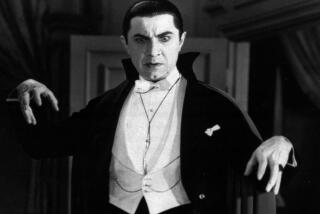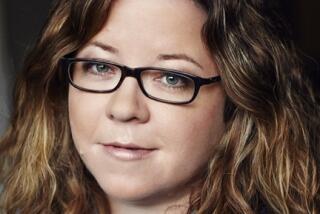Column: Patt Morrison asks: ‘Lore’ podcast creator Aaron Mahnke on the fantastic tales humans love
Logic, science and common sense have blazed the trail to humankind’s triumphs. But oh, how we love to wander off that bright path toward the campfire shadows, to hear legends of things that go bump in the night. The mysterious and the implausible — from bizarre tales that gained traction in the 2016 presidential campaign, to macabre old legends of the supernatural — are irresistible. Each month, more than 2.5 million people tune into Aaron Mahnke’s podcast “Lore.” He drills far into the factual origins of unsettling tales of vampires, lost adventurers, premature burials, spiritual powers, spectral sightings, dream coincidences and witchery. This year, “Lore” is being adapted into an Amazon TV anthology series, bringing the visual to the aural. Mahnke muses about how humans always believe that a good scare is a good idea.
CLICK HERE TO LISTEN TO THIS INTERVIEW ON THE ‘PATT MORRISON ASKS’ PODCAST »
How did you get interested in this subject?
For me scary stories go back to grade school, probably about fifth grade. I remember having a writing teacher and probably in early October, she assigned us a short story we had to hand-write. So I wrote a scary story because that’s what I was interested, in and that love has stayed with me ever since. I have an undergrad degree in psychology. That kind of colors how I look at things. I think, what are people’s motivations, how do people make decisions and process the experiences they go through?
What have been your influences since then?
I love the works of Stephen King, Neil Gaiman. I think that both of them get kind of lumped into, that Stephen King is a horror writer and Neil Gaiman writes for the fantasy world. I think they bring a lot of humanity to the table. They’re full of stories of human who are put into extraordinary circumstances and have to find their way out of them. By the end of “The Shining” I don’t really care whether Jack Torrance gives in, whether he fights back, is killed, or wakes up and it’s all been just a dream, right? I just want to know what’s on the next page.
Of your podcasts, do you have one or two that are favorites?
There’s an episode called “Half-Hanged,” about a woman named Mary Webster, and her story feels very modern, in the sense that this was the late 1600s, she was in colonial western Massachusetts. But she was a woman who spoke her mind, she wasn’t very religious, and all of these qualities didn’t fit in with what people expected women to do in in the late 1600s.
Because of that, she wasn’t very well liked. And back then, if you didn’t like somebody, it was very easy to label someone a witch and let hysteria take over from there.
She was acquitted of accusations of being a witch in Boston, and about a year later, a town elder became sick and they couldn’t figure out what was wrong with him. So they decided it was because Mary had cursed him, and some of the local men walked to her house, dragged her outside of her door and then hanged her in the tree.
What I love about the story is that they cut her down and they walked away, and the next morning she got up and walked away from it. She had somehow survived — in what feels like the biggest middle finger you could think of to a town that didn’t like you.
She had family and that family eventually moved to Canada, and [author] Margaret Atwood is [supposedly] a descendant of Mary Webster. She wrote a poem called “Half-Hanged Mary.” There are 12 stanzas about the 12 final hours of her life — or what should have been the 12 final hours — and it ends with this line that says, “I wasn’t a witch before but now I am one. If you thought I had magic before, I just walked away from the hangman’s noose.”
There’s something modern about it, about how in our own ways we still drag the “others” of our society out and string them up in a tree in a figurative way. We haven’t matured, we haven’t gotten better in those 300 years. We still do it. Mary’s story gives you hope because she managed to survive that and escape that in a way. There’s power in that.
I have chills.
That’s my job!
In the last year, with this election, have you see anything that puts you in mind of the behavior you see repeating itself in your work?
We certainly haven’t seen the best of humanity in the last year, that’s probably a safe thing to say. We’ve become almost like people have been given permission to fall back on deep prejudices and knee-jerk reactions.
I think that some people look for permission to do that, and that’s why we’ve seen more of it in the last year than we have in a very long time. And to think “what-ifs” about the future, that we could be taking steps backward — it’s pretty frightening. And I tell stories like that for a living!
Tell me a bit about your novels.
For my novels, I like to dig into New England folklore, the mythology, the superstitions, the things that are unique to this part of the country. That’s originally what I was trying to do when I created “Lore.” It was just sort of a happy accident that came out of that.
Was there one that made you think, there’s a podcast in all of this?
I had read that if you want to grow the readership of your book, it’s good to be connected to [readers] over email, that you can build an email list where you reach out periodically and say, Hey, I have a new book — you should go buy it.
I thought, well, nobody just gives their email address — they need an incentive to do that. I created this nonfiction document that I would give them as a PDF. It was going to be like five favorite New England folk tales with a historical yet spooky bent to them.
I wrote four of the five, I looked at the word count and I panicked, because they’d gotten so big that I personally wouldn’t have the time to sit down and read it, especially in PDF. And I had that literal moment of dragging the files to the trashcan on my desktop and I just hovered there for a second.
And I thought, you know, I don’t read a lot of books because I do audio books — that’s how I take in my content, is through audio. So my plan was to record these five essays as sort of a home-brew audio book and give that away. I had no idea that it would work as a podcast until I let a friend listen to the very first one. He said, You should put this out as a podcast. And I gave it some brief thought and then just jumped in with both feet.
“Lore” won an award for history podcast, which is interesting considering some of the stories you do. Do you consider yourself a historian?
I’m an armchair historian. But I do like to find stories that have a lot of provenance or that there are written records very close to the events that happened. Obviously when you get into the realm of ghost stories, people can record their sightings or whatnot but that doesn’t necessarily make it true.
I try to avoid things that all they have to prove their existence is a Reddit post or a meme that hangs around the internet for a while. I probably won’t touch on things like Slenderman, but the story of an Irish woman being burned alive by her husband because he thinks she’s a changeling replaced by the elves — that’s a real event that really happened, and that’s compelling.
You’ve been doing this long enough — you must have a sense of why we like to scare ourselves virtually.
In some ways I think it’s because it’s nice to know that someone else’s life is worse off than ours. That may be the root of why people rubberneck on the highway when you drive by an accident. Part of that I think has to do with the fact that we’re just glad it wasn’t us. At the same time, I do think scary stories help us feel like we’re alive. That heart racing, that adrenaline rush — it reminds us that everything is working. There’s enough scary stuff in the world right now. These are moments of escapism, however much rooted in true facts I try to find the stories that are.
Has it changed your views of the nature of humanity or human history?
It’s a lot easier to look at strangers and wonder, knowing the potential that people have toward the weird, the violent, the tragic, for what they believe are very good reasons. Obviously to some degree I’m studying the ghost stories and true crime and weird unknown creatures, but at the same time, I’m studying people, and why in the world we share those stories.
It’s tough sometimes to be on an airplane and you just look around and wonder — right?
And you, do you subscribe more or less to the “Hamlet” quote that there are “more things in heaven and earth … than are dreamt of in your philosophy”?
I do know that we’re really good at looking for reasons, just as humans. We want to explain why something happens. Early on, it was, Why in the world does that yellow thing come up from the horizon and then sail through the sky and disappear? And we made stories that explain that.
Eventually science explains a lot of things, but there are still a lot of stories that science hasn’t touched on, or that science never could touch on, and it does make you wonder. I think mystery adds texture to life, so to try to explain everything away with rationality would probably create a life that has a lot less flavor in it.
The podcast is really basic. There’s some music and you tell a story. There’s no reenactment. Was that a deliberate decision on your part to keep it as something like sitting around a campfire telling stories?
If you’ve ever been to New England, there’s a lot of old homes. My house isn’t the oldest in the area, but my office is angular, with horsehair plaster and hardwood floors and sharp-edged furniture. So my first recordings were really echo-y and tinny, and the music was in a lot of ways like what an Instagram filter does to a bad photo — makes it look a little bit better. The music took a little bit of the tin and a little bit of the echo out of my voice and made the recording palatable. Looking back, it makes sense that it’s part of the mood, it’s part of the environment.
How do you see that transitioning to the visual?
It’s certainly going to be a new sort of television show. And with “Lore,” I think we plan to take some risks. We’re blending high-quality dramatic retelling of these true historical stories with unique documentary elements that bring context to the story. And woven through all of that will be narration, in a lot of the same way the podcast has, tying it all together, moving people like a tour guide from station to station.
Follow the Opinion section on Twitter @latimesopinion or Facebook
More to Read
A cure for the common opinion
Get thought-provoking perspectives with our weekly newsletter.
You may occasionally receive promotional content from the Los Angeles Times.











